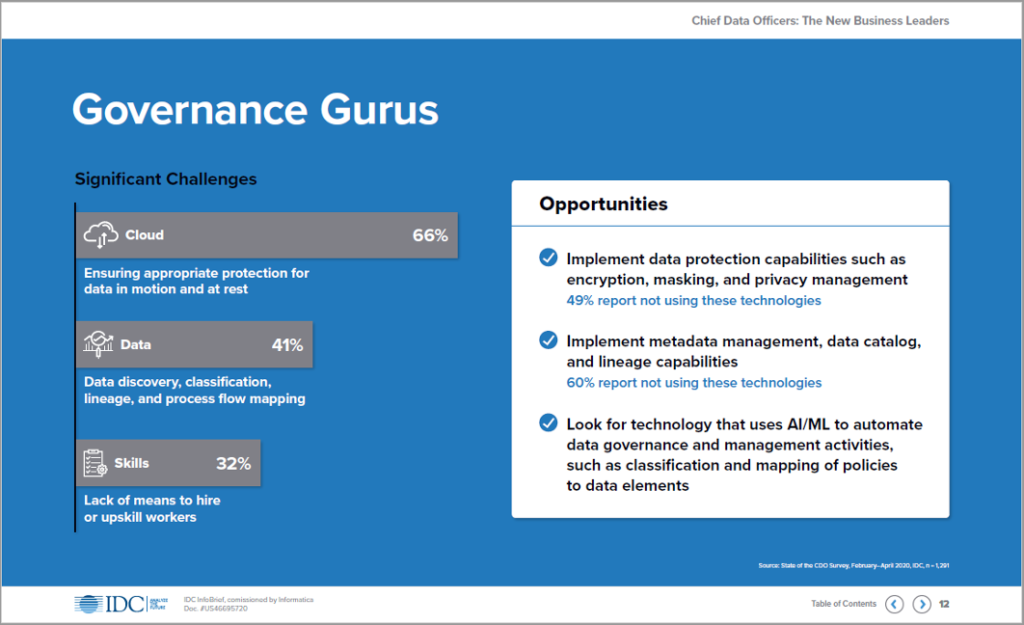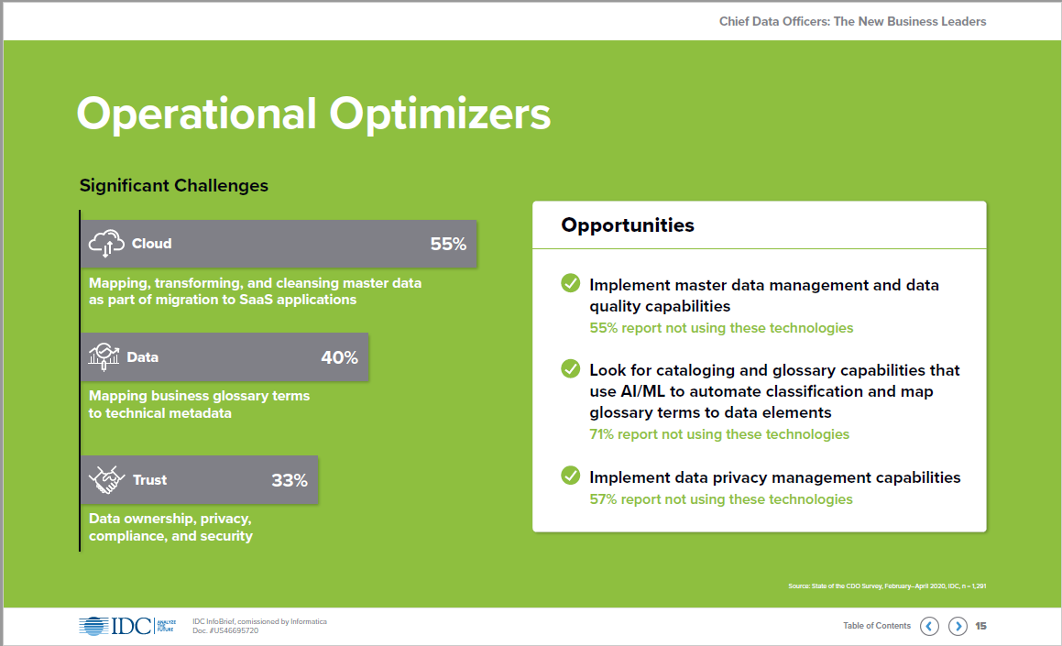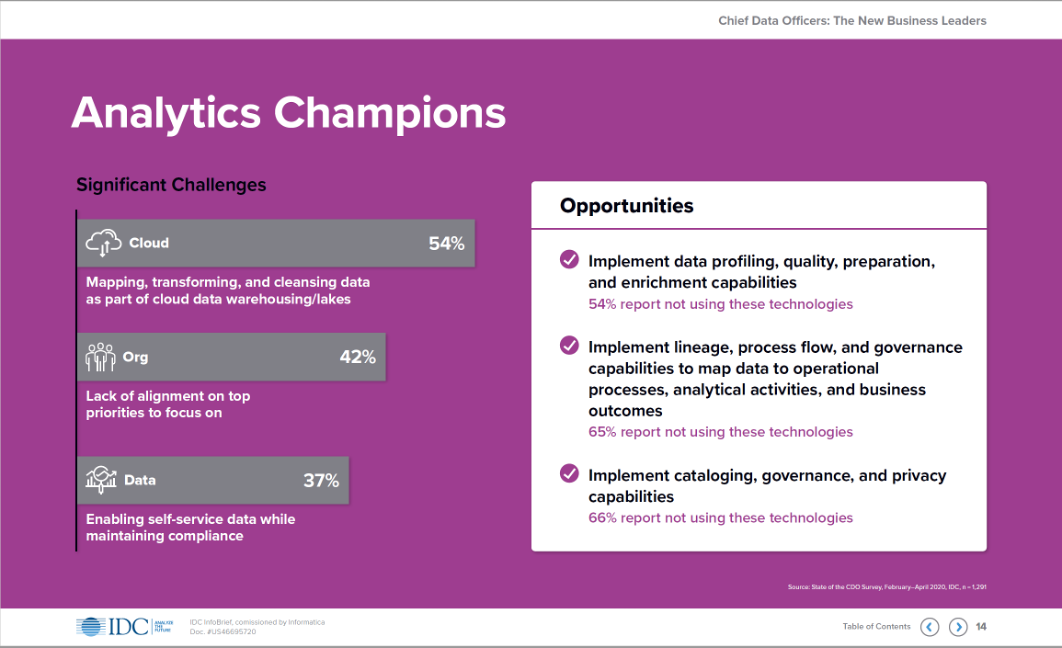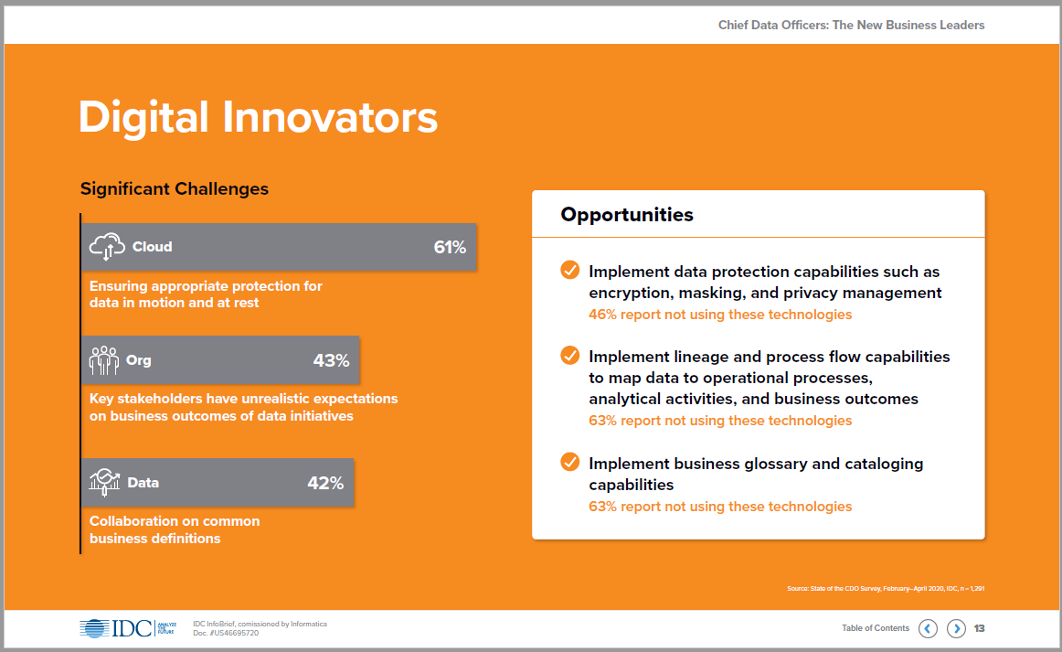Chief Data Officers: Challenges and Opportunities

In my last blog, I wrote about the four archetypes of data leadership identified in IDC’s state of the chief data officer (CDO) survey [1] commissioned by Informatica. In this blog, I will dive deeper into the challenges and opportunities for each of those archetypes (Governance Gurus, Operational Optimizers, Analytics Champions, and Digital Innovators). For those that have not read my previous blog, while these four archetypes are not mutually exclusive, CDOs tend to have a center of gravity in one of the archetypes.
Governance Gurus are focused on building data governance frameworks, policies, rules, processes, and organizational structures and ensuring regulatory compliance. They are looking to discover data, classify it, and understand its lineage and how it’s used in business processes and systems. They are also looking for ways to increase data literacy throughout the enterprise, like creating common definitions and business glossaries for data.

The survey found that ensuring appropriate protection for data stored in—and in motion between—multi-cloud sources is the most significant challenge for Governance Gurus. Given the acceleration of cloud data warehouses, cloud data lakes, application modernization (SaaS), API-based data exchange (iPaaS), digital commerce, and work from home trends, this finding didn’t surprise me. What did surprise me was nearly half of the respondents reported not using encryption, masking, or privacy management capabilities that can help address protection challenges and mitigate data risk.
Governance Gurus also reported data discovery, classification, lineage and process flow mapping as significant challenges. Not knowing what data you have, whether it is subject to privacy or industry regulations, and how it is processed and shared makes it difficult to manage the number of data privacy, protection, and security-related incidents, which is the top key performance indicator (KPI) for Governance Gurus. Since 60% of respondents aren’t using metadata management, data catalog, or lineage capabilities, there is a significant opportunity for CDOs to address these challenges.
And lack of skills creates significant challenges in executing data governance and protection across the enterprise. Seventy five percent of Governance Gurus said they had four or fewer people in data privacy management roles, and 25% reported zero data stewards. With so few human resources, technology that uses machine learning and artificial intelligence to automate and scale data management activities is critical to CDO success.
Operational Optimizers are focused on building and deploying the infrastructure, tools, technology, processes, and systems to support organizational operations. They are looking to ensure data is readily available and fit for use to drive operational efficiency and business productivity. They are also looking for ways to automate business processes and data management activities to reduce costs.

Cloud was also the most significant challenge for Operational Optimizers; however, their issues were around data migration, quality, and consistency in SaaS applications. While SaaS applications offer the potential benefits of cost savings, greater productivity, and increased business resiliency, not understanding what data you have, what to migrate, what to archive, and what to delete, as well as how to map and transform data to new application database schemas, can impair realization of the benefits. Master data governance can help CDOs standardize core definitions across master data domains, which will increase efficiency and effectiveness of activities to map attributes between applications, validate the accuracy and completeness of data being migrated, and ensure consistency of master data across SaaS applications.
Operational Optimizers reported mapping business glossary terms to technical metadata, as well as collaboration on common business definitions, to be significant data challenges. Given the fact that operational efficiency and cost reduction related KPIs are two of the top three measures of success for Operational Optimizers, I’m surprised how few are using cataloging and business glossary capabilities. The use of artificial intelligence (AI) and machine learning to automate tasks such as linking glossary definitions to technical metadata fields—as well as data classification and mapping governance policies to data based on those classifications—represents a significant opportunity for CDOs to increase productivity.
Lack of trust in the data creates significant challenges in operationalizing the use of the data for analytical and operational processes. And it is not just trust in the quality of the data but also trust in the appropriate use of the data. What are the policies regarding access, use, and sharing? Who do I talk to if I’m unclear on policies? Data governance and data privacy management capabilities can help Operational Optimizers provide greater transparency into what constitutes compliant and ethical use of the data to speed and broaden its use to drive better business outcomes.
Analytics Champions are focused on monitoring business performance and generating insights that can help change business outcomes. They are looking for ways to increase the speed and accuracy of reporting, forecasting, planning, and analysis to provide greater transparency into performance and accelerate decision making to quickly adapt to changing conditions. They are also looking for ways to automate analysis and increase predictiveness using machine learning and AI.

Not surprisingly, cloud data warehouses, cloud data lakes, and cloud data lakehouses are the biggest challenge for Analytics Champions. With so much data coming from so many sources, in batch and real-time, it’s difficult to ensure the data is fit for analytical use cases. Implementing data profiling, cleansing, and enrichment capabilities can help, not just with preparation for migrating data to the cloud, but also preparing data for machine learning (MLOps) activities in the cloud.
The survey was in the field between February and April of 2020, when organizations were having to deal with the initial impact of the COVID-19 pandemic. Priorities were changing rapidly—cash flow and liquidity management were top of mind for CFOs, digital commerce was accelerating at an unprecedented pace, and supply chains were being disrupted around the world. This may have influenced the number of Analytics Champions reporting lack of alignment on top priorities to focus on as a significant challenge. One of the ways CDOs can help in gaining alignment is to use data lineage and process flow capabilities to demonstrate how data is used in analytical and operational processes to impact business outcomes.
One of the things that I have heard consistently from CDOs over the last several months is the need to use data to deal with the impact of COVID-19, by analyzing what was happening in the business, creating multiple scenarios, and quickly adjusting plans to ensure business resiliency and continuity. Enabling self-service data access that can accelerate data use and business agility was cited as a significant challenge by Analytics Champions in the survey. A data marketplace enables you to curate and publish data assets with quality status and governance policy context. Shop for data assets either by browsing by categories or searching based on criteria like glossary term, domain, quality, and classification of data. And enforce privacy and protection polices such as applying masking as part of the data provisioning process to ensure regulatory compliance.
Digital Innovators are focused on using data and analytics to create business value. They are looking for ways to monetize data, such as generating more revenue from current customers, entering new markets, or innovating their products, services, and business models. They are also looking for ways to digitize and automate their business processes to create frictionless experiences.

Cloud is also a significant challenge for Digital Innovators. Companies accelerated their journey to the cloud in the wake of COVID-19, and one driver of that migration was the ability to deploy new digital customer experiences quickly and effectively. Many CDOs report doing things in days that would have previously taken months. Since consumers that trust a brand are more than twice as likely to buy first, stay loyal, and advocate that brand, implementing data privacy and protection capabilities for data at rest and in motion in the cloud is critical for Digital Innovators.
Digital innovators also reported key stakeholders have unrealistic expectations of the business impact of data and analytics initiatives. While data lineage and process flow mapping can help CDOs demonstrate where friction points occur in customer journeys that span multiple channels and touchpoints, digital transformation of customer engagement processes are irrelevant if employees don’t have the skills to adapt to new business models and ways of working. Innovation leaders understand that investing in talent is also a critical factor for success and find creative ways to deliver skills training.
Business context of data is also critical for digital transformation success. For example, automation of finance processes is a key agenda item for CFOs, but automating process like order to cash and procure to pay requires a common definition and understanding of a customer, a supplier, a purchase order, payment terms, and an invoice. Digital innovators have the opportunity to help the success of digital transformation efforts by implementing capabilities that make it easier for all stakeholders to collaborate on common business definitions. Ensuring everyone speaks about the business using the same language and data enabled McGraw-Hill to transform from a print to digital based subscription business.
I would love to hear your thoughts on the challenges for the different archetypes of data leadership. Which of the challenges are the most difficult in your opinion? Which have the potential for the biggest impact if addressed? What best practices can you share with your peers to address some of these challenges?
The challenges and opportunities for the four archetypes of data leadership is just one set of insights from the state of the CDO survey. To learn more, download the IDC Infobrief.
[1] IDC Survey InfoBrief, sponsored by Informatica, “The Priorities, Challenges, and KPIs of Today’s CDOs,” IDC Doc. #US46695720, August 2020.








